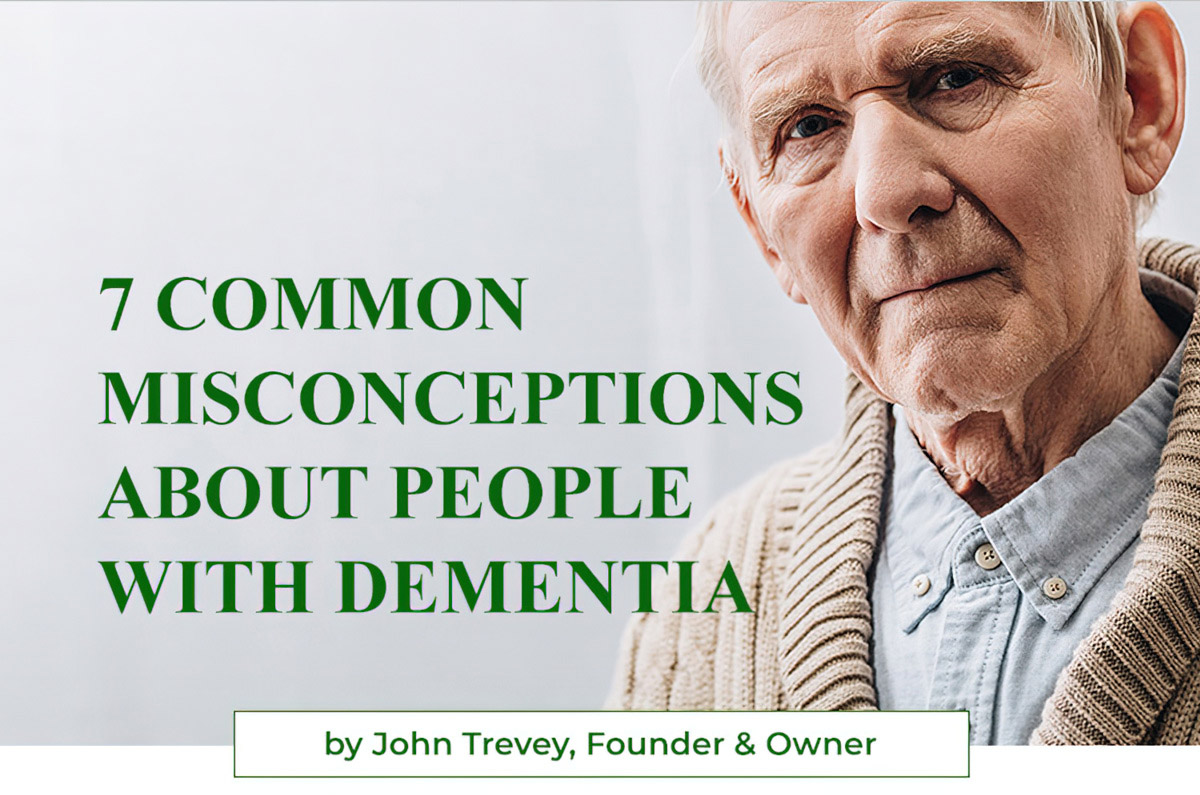7 Common Misconceptions About People with Dementia

Dementia awareness
Although dementia awareness has greatly increased in recent years, and people are more educated about Alzheimer’s and other types of dementia now more than ever, misconceptions about dementia are still prevalent.
Those who haven’t experienced or seen the disease up close can easily believe these misconceptions, furthering the stigma around dementia. This is why it’s important to know the common misconceptions about people with dementia and what the truth is.
The less dementia is stigmatized, the more accepting and understanding we can be of those who have it. The more understanding we are, the better we will be able to understand this disease for what it really is, conduct proper research and develop effective medications and preventative treatments.
1. Misconception: Dementia only happens to older people.
Truth: You’ve probably heard people refer to Alzheimer’s disease as “old timer’s” disease. This is based on the stigma that only older adults get dementia. This simply isn’t true.
Early-onset dementia can occur in people as young as their thirties. Young-onset Alzheimer’s disease typically begins when someone is in their fifties. Frontotemporal degeneration, another form of dementia, can also start at an earlier age.
2. Misconception: Dementia is caused by aging.
Truth: Dementia is not a normal part of aging or simply caused by getting older. Many people age into their eighties and nineties without getting dementia. Dementia is caused by neurodegeneration in the brain. A number of factors can contribute to this, including head injury, diabetes, and stroke.
Some memory loss is common with aging, but not the type of memory loss caused by dementia. This type of memory loss is debilitating and ultimately fatal, as the brain will eventually no longer be able to function.
3. Misconception: Dementia is hereditary.
Truth: Just because your parent or grandparent had dementia or Alzheimer’s does not mean you will get it too. Less than 5% of people living with Alzheimer’s inherited it through a family member. While there are certain gene mutations that can put you at higher risk for Alzheimer’s, having one of these mutations does not guarantee you will get it.
Early-onset Alzheimer’s and Creutzfeldt-Jakob disease, another form of dementia, are more strongly linked to genetics.
4. Misconception: People with dementia are unaware of the world around them.
Truth: People with early-stage dementia have mild symptoms and are able to make decisions for themselves, take care of themselves and function well. People in the more progressive stages of dementia may seem confused or like they don’t know what’s going on, but they are still people who deserve respect, and they are probably aware of more than you think. They just need to be communicated with differently so they can respond effectively.
5. Misconception: People with dementia are violent or aggressive.
Truth: If someone with dementia is acting violent or aggressive, it is likely a sign of an unmet need that they’re not able to communicate effectively. Violence and aggression aren’t symptoms of dementia. Changes in the brain and behavior are, so the violence and aggression are stemming from those changes and the confusion caused by dementia.
If you are around someone who has dementia and has an aggressive outburst, find out what is causing this person to feel distressed then do what you need to do to take away that cause and restore calm to his or her environment.
6. Misconception: If you are diagnosed with Alzheimer’s or another form of dementia, you will decline rapidly, and your quality of life will suffer.
Truth: Dementia affects everyone differently. Some people live many quality years after receiving a diagnosis. Others decline rapidly. It typically depends on when the neurodegeneration began, which is often unknown. But just because you have a diagnosis, doesn’t mean your life is over. There are many things you can do to maintain your quality of life as you progress through the disease.
Making brain-healthy choices can help slow down the disease and add good years to your life. Brain-healthy choices include eating a healthy diet, getting regular exercise, maintaining an active social life and continuing to challenge your brain.
7. Misconception: If I eat _________ or do _________ or take ______, I can prevent dementia.
Truth: There is no conclusive evidence that a certain diet, behavior, medication, vitamin or supplement will guarantee you won’t get dementia. But there are behaviors that can reduce your risk of developing the disease. The brain-healthy choices we listed above all contribute to helping reduce your risk of getting dementia or Alzheimer’s in addition to getting enough sleep, managing your stress and not smoking.
In their voices
Listening to people who have dementia describe their experience can be incredibly helpful in reducing the stigma around the disease.
The Mayo Clinic interviewed several people living with Alzheimer’s or dementia to hear what they had to say, how they felt about the disease and what they wish other people knew:
I am a person. Know me and relate to me as a person with a unique background, life history, interests, and capabilities. When you call me a “patient,” “victim,” or “sufferer,” I feel minimized.
Understand that my personhood may become hidden, but it is not lost.
Promote ways I can continue to experience personal growth and development through purpose, meaning, relationships and enjoyment in my daily life.
People with Alzheimer’s or dementia are still people. They still have families, histories, hopes, and dreams. This disease doesn’t have to take away from that, but when we believe the numerous misconceptions and succumb to stigmas, we will naturally distance ourselves from people living with Alzheimer’s and dementia. This further perpetuates the stigmas and misconceptions.
On the other hand, when we don’t shy away from those who have a disease we may not understand, we can learn something from them. When we have conversations with people who have the disease or those close to them, we can learn how dementia really affects people and what they’re actually capable of.
Reducing stigma and debunking the myths about dementia is crucial in order to move forward with learning more about the disease, its causes and how to prevent it.






